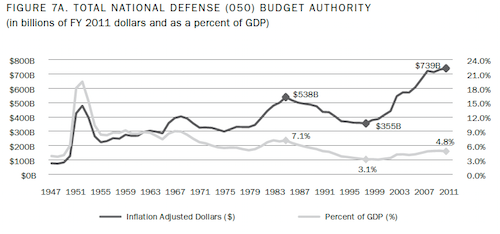Defense and Engineering Talent
Defense contractors quoted in Mark Thompson's piece on the Pentagon budget raise an important and too-often-neglected issue:

The defense industry recoiled from the very notion. "The highest constitutional responsibility of the federal government is to protect the American people from foreign aggression," said Marion Blakey, head of the Aerospace Industries Association, a major defense trade group. "The co-chair recommendations in the defense arena, if implemented, would exacerbate the coming shortage of engineers and undercut the capability of the nation's defense industrial base to design, build and support complex cutting-edge defense systems."
I'm glad to see Blakey put this on the table, though her perspective on which way it cuts is bizarre. The point is that you have to think not just about the fiscal cost of things, but also their social costs. If we give US Marshalls slightly shinier badges, that might cost some money, but there are no negative broader implications. The real problem with overspending on defense, by contrast, is that the defense establishment competes for people with civilian sectors of the economy. The guys who are building these cool military exoskeletons, for example, are obviously very talented. And the supply of talented engineers isn't all that elastic. When they supply their talents to defense-related projects, the civilian economy is starved of talent.
Sometimes this makes sense. The Manhattan Project involved a huge proportion of the world's finest scientific minds and rightly so. But undertaking that kind of civilian to military brain drain all the time can be very harmful.
Engineers aside, it seems to me that there's a broader worry here about military personnel. It seems to me that there's substantial (though obviously imperfect) overlap between the kind of character traits and skills that make for an effective soldier and make for an effective police officer. Here, too, merely looking at the fiscal cost of paying a soldier's salary doesn't capture the real effects. Some countries don't really try to maintain first-rate personnel quality in which case soldiering serves as a kind of useful employment and job training scheme. But America is trying—and succeeding—to field a huge quantity of very good soldiers which takes the people with the potential to be highly effective soldiers out of the civilian economy where they could be doing other things.


Matthew Yglesias's Blog
- Matthew Yglesias's profile
- 72 followers



